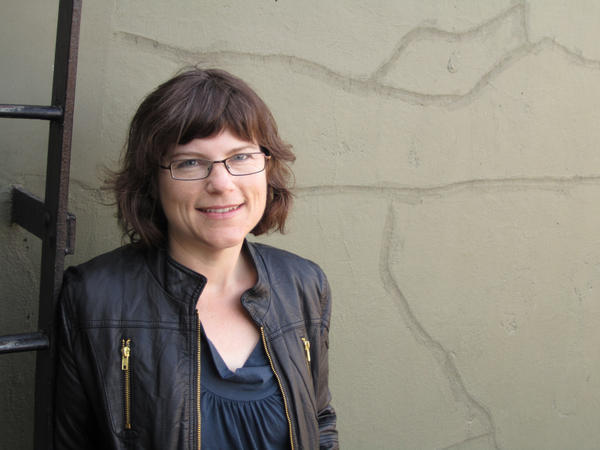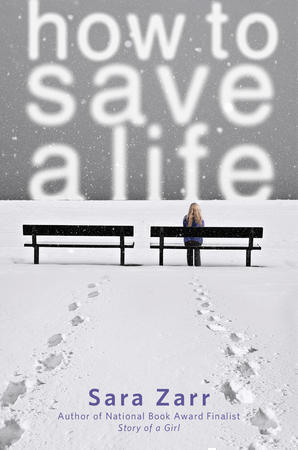
Sara Zarr is he author of “Once Was Lost,” “Sweethearts” and the National Book Award finalist “Story of a Girl.” Below is a complete transcript of her interview with Cracking the Cover for the release of her latest book, “How to Save a Life.”
Background — Have you always wanted to write? Why?
I was always a reader, and always making up stories, but it wasn’t until after college that I honed in on the idea of writing as a career. As for the “why,” that’s a tough question to answer. It’s the kind of thing you do because you can’t stand not to.
Why write for young adults?
Again, I feel like this is something that came along with the desire to write, without me really choosing it. When I thought of stories, they almost always featured characters in high school. I’m sure part of that came from how much I loved reading contemporary realistic YA as a teen and in my twenties (and still).
Do you have any rituals? Do you write all day?
I don’t do actual prose composition all day; I think my brain would explode! But I generally have a pretty full day of “being a writer.” Especially around book release time, there’s a lot of email to field and social networking, speaking, and travel to do. For the writing itself, the ritual includes turning off the Internet, turning on some specific music, and maybe pouring some coffee. The actual writing part of my day might be an hour and a half to three hours, maybe four or five if I’m under a tight deadline. But anything over three is rare for me.
Where did the idea for “How to Save a Life” come from?
The idea sparked from a writing prompt I found that said to write a scene involving an adult talking his or her aging parent out of adopting an infant. Because I write YA, the “adult” in my version of the scene was seventeen.
Briefly tell me a little about it.
Jill is ten months into grieving the loss of her dad. Mandy, eighteen, is pregnant and more or less alone in the world. Robin, Jill’s mother, is adopting Mandy’s baby, and Jill is not happy about this. The book opens with Jill and Robin waiting for Mandy to arrive on the train, their lives join up, and, as we say in the biz, drama ensues!
 You really capture the essence of both Jill and Mandy. Did their voices come easily? Was it difficult to switch between the two?
You really capture the essence of both Jill and Mandy. Did their voices come easily? Was it difficult to switch between the two?
At first, I had a lot of trouble with Mandy. Jill’s chapters poured out of me, and Mandy’s felt like a slog. Because, I suppose, I’m a lot like Jill and understand her and the way she deals with pain. Mandy was more of a mystery to me and it took some time to find her voice. The switching itself wasn’t hard, though. I enjoyed the freedom to do that and the different storytelling things you can do with a shared narrative.
Who is your favorite character in the book? Why?
I can’t pick a favorite! It’s probably my favorite cast of characters out of any of my books, and I’m a fan of them all.
What were the challenges working on ” How to Save a Life”? The highlights?
The challenge, as it is for me with every book, was figuring out “what happens.” Also known as “the plot.” I had these people, and the basic situation, but a situation is not a story. Thinking about what brought each girl to the moment they were now in took some work. My favorite parts to write were the ones that bring Jill and Mandy in direct conversation and, sometimes, confrontation. Whenever they were on the page together, it was a lot of fun for me.
What do you hope readers will get out of ” How to Save a Life”?
Like I always say, my primary hope is that people get a great reading experience. That they put the book down and say, wow, I enjoyed that, that absorbed me, that entertained me. There’s a lot to get out of this story beyond that, but I like to leave that up to the reader.
What are you working on now?
My next young adult novel, which is tentatively slated to come out spring 2013. I recently finished a first draft and I’m too traumatized to talk about it much now!
Looking back, how has your writing evolved from when you first started until now?
That’s a good question, if hard to answer. It takes me less time now to get from first stuttering starts to something decent. That’s just because of the nature of practice and experience. I hope that as I continue to get older, I get wiser, and I hope that shows in my writing. I’m less concerned now with what people think and more concerned about what I think, and if I did the job I wanted to do. Those are some changes. I expect there are plenty more to come!
Did you have a favorite book or book that really resonated with you as a young reader?
One book that affected me profoundly was Madeleine L’Engle’s HOUSE LIKE A LOTUS. It’s a rare L’Engle book that’s gone out of print, and I read it right at a moment I was going through a lot of the same things the character was. It’s a beautiful book.
